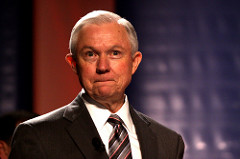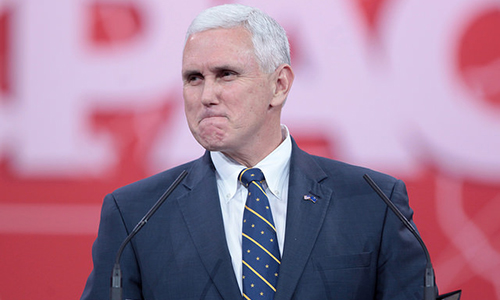Political Groups Pen Anti-RAWA Letter to Pence, Sessions
In November, ten state Attorneys General wrote a letter to Vice President-elect Mike Pence and the “Trump transition team,” urging them to reverse the 2011 Wire Act clarification issued by the U.S. Department of Justice’s Office of Legal Counsel (OLC), a reversal which would effectively make online gaming illegal in the United States, even in states that have legalized and regulated it. On Thursday, a coalition of eight political organizations wrote a letter to Pence and Donald Trump’s U.S. Attorney General nominee, Senator Jeff Sessions, encouraging them to do the opposite.
The letter was posted on the website of the Competitive Enterprise Institute, “a non-profit public policy organization dedicated to advancing the principles of limited government, free enterprise, and individual liberty.” The complete list of signatories is as follows:
Michelle Minton – Fellow, Competitive Enterprise Institute
Andrew Langer – President, Institute for Liberty
David Williams – President, Taxpayers Protection Alliance
Norman Singleton – Vice President of Policy, Campaign for Liberty
Andrew F. Quinlan – President, Center for Freedom & Prosperity
Katie McAuliffe – Executive Director, Digital Liberty
Tom Giovanetti – President, Institute for Policy Innovation
Paul Guessing – President, Rio Grande Foundation

Sen. Jeff Sessions
Photo credit: Gage Skidmore via Flickr
As has been widely reported, Sessions had his confirmation hearing this week, a brief moment of which involved a question from Senator Lindsey Graham, the man who does Sheldon Adelson’s bidding in the Senate by continuing to push Adelson’s Restoration of America’s Wire Act (RAWA) or the like on a Congress and an American public who is just sick of this shit already. Naturally, Graham asked his buddy about the OLC’s clarification of the Wire Act.
Sessions said he was “shocked” by the OLC’s opinion – implying that he was against online poker and gambling – but then admitted that he hadn’t studied it yet so couldn’t offer an informed opinion. It does seem to most in the poker community, though, that Sessions’ mind is pretty much already made up and will do his best to find a reason to overturn the OLC’s opinion.
This is bad and the eight signatories to the letter know it. The letter began:
After a contentious election year, a divided nation looks to the new Trump administration to make good on promises to “drain the swamp” and change the way Washington does business. We, a group of free-market, limited-government, and freedom-oriented organizations, respectfully urge the new administration to honor that promise by refusing special interest demands for a federal prohibition on Internet gambling.
Everybody knows that RAWA was a product of Sheldon Adelson, everyone knows it is crony capitalism, which is a big reason why it hasn’t been taken too seriously on Capitol Hill, but when he is Attorney General (and he will be), Sessions may end up canceling the OLC’s correct Wire Act interpretation and basically RAWA it up, anyway.
The letter’s authors continued, explaining the whole deal with the Wire Act and the OLC clarification:
Although prior administrations have chosen to interpret the Wire Act as creating a de facto prohibition on Internet gambling, this was clearly not the intent of Congress when it was enacted in 1961. Its purpose was “to assist the various States in enforcement of their laws pertaining to gambling and bookmaking,” [emphasis added] and this is according to testimony from the law’s very own architect, Attorney General Robert F. Kennedy.
[snip]
Though Sen. Sessions indicated in his January 10th confirmation hearing that he was “shocked” by the opinion, the OLC memo was not a “reinterpretation,” of the Wire Act’s intent: it merely restored the law to its original meaning.
And then there is the whole “slippery slope” argument:
Despite that RAWA is backed by a small number of Republicans, Republicans have also been its most vociferous opponents. Many have raised concerns that the bill violates the Tenth Amendment of the Constitution, undermining states’ authority to regulate intrastate commerce and setting a dangerous anti-federalism precedent. Today, it’s online gambling, but in the future it might be gun and ammunition sales targeted by Congress or an over-zealous executive branch. The decisions made now about online gambling could hold consequences for all sorts of issues for years to come.
The letter went on to explain how banning online gambling would only serve to hurt consumers, as they would seek out unregulated, “black market” sites at which there are no protections should something go wrong. The scare tactics of claiming that online gambling leads to increases in crimes like fraud, money laundering, and underage gambling, are bullshit, as well, as evidenced by the success of regulated internet gaming industries in New Jersey, Delaware, and Nevada.
The letter also discusses how denying states the ability to regulate their own online gambling industries denies them the opportunity to bring in millions of dollars of extra tax revenue.
To conclude, the eight writers said:
Reinterpreting the Wire Act would not “restore” it to its original meaning or uphold the legislative process. Instead, it would have the opposite effect by changing the original intent of the Wire Act and circumventing Congress and the legislative process. And, perhaps what’s worst [sic], is that it would severely injure one of our nation’s founding principles: the idea that the federal government’s power should be limited and states should be free to regulate intrastate commerce as they see fit. This principle has been under assault for more than eight years. If the Trump Administration truly hopes to “drain the swamp,” we, the undersigned groups and our members, respectfully urge you to begin by defending the Tenth Amendment and rejecting cronyist calls from casino interests to create a national gambling ban.
If only we could just legalize online poker nationwide. If only.
Featured photo credit: Gage Skidmore via Flickr



















COMMENTS